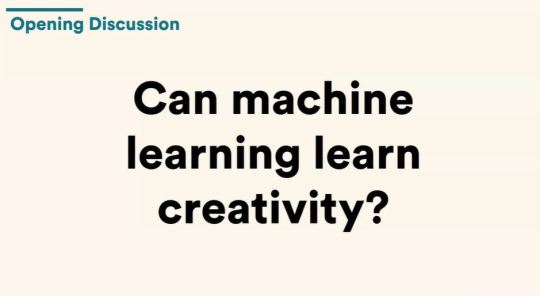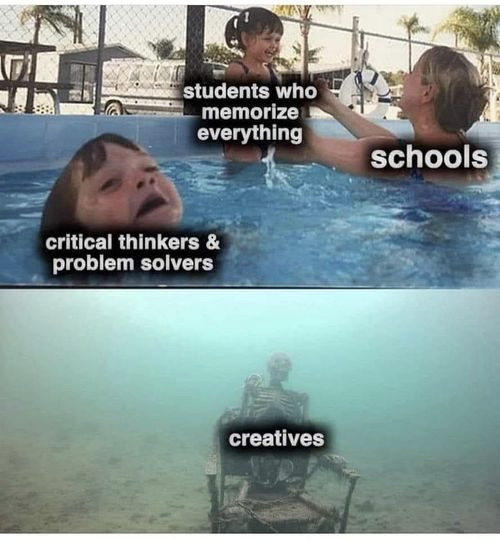#creative education
Text
Championing and supporting the state's creative industries, spanning arts, culture, screen, design and more.
The Creative Exchange Podcast delves into topics affecting artists and the creative community such as AI, career sustainability, funding and more. Episode one out now.

#creative industries#spanning arts#culture#art screen#creative design#audio podcast#creative education
0 notes
Text
0 notes
Text
Spotlight on Success: Fortune Academy's Theatrical Wonders & Life-Changing Performances
Julie Pappas & Renee Merrifield: A Candid Chat on Fortune Academy, Surrounded by Playful Theater Students
Join Renee Merrifield as she interviews Julie Pappas, the passionate founder of Fortune Academy, a school dedicated to transforming the lives of children with learning differences. Discover how this unique institution empowers its students through specialized education and a thriving theater…

View On WordPress
#ADHD#arts education#creative education#dyslexia#educational approach#empowering students#Fortune Academy#inclusive environment#innovative teaching#inspiring educators#interview#Julie Pappas#learning differences#learning disabilities#personalized learning#Renee Merrifield#school founder#specialized education#student success#support#theater program
0 notes
Text
Something I miss from earlier eras of the creative side of the internet was things just being unabashedly low-budget. Just all unashamedly amateur, unprofessional, ‘I don’t own a good camera but I have a story to tell you’, ‘I can’t afford a good mic but I have a song to sing for you,’ ‘I don’t have any kind of background in editing or lighting and I only just picked up this guitar last Tuesday but here’s an entire musical me and my friends wrote about our favourite book, we filmed it on a potato and put it up on YouTube in ten minute segments because we thought it was pretty funny.’
#everything felt so much less like Content then#and as someone who wants to share creative stuff online#it’s now incredibly daunting thinking about doing that bc#especially as a disabled person who can’t work full time#it feels almost impossible to extricate art from being Content#like there’s this immense pressure to produce things that could pass as professionally produced by a team of educated people#and to make smart decisions so that somehow eventually you can profit off your art#and instead of it being a ‘hey look at my silly little song’ it becomes#competing in an over saturated market already dominated by the nepotism afforded by wealth and connections#and it feels like it would very difficult not to measure my personal satisfaction with how a certain piece of art turned out#by how much attention it got online#even though I genuinely have zero desire to be famous and it sounds like a complete nightmare#anyway I’m gonna have ice cream for dinner how about you guys#hmp42
5K notes
·
View notes
Text
Get Crafty ✨
#crafts#inspiration#creative#cool#pay attention#educate yourself#educate yourselves#knowledge is power#reeducate yourself#reeducate yourselves#think for yourself#think for yourselves#think about it
2K notes
·
View notes
Text
Free Thai language learning resources
I’ve been learning Thai for the past 20 months. This list is by no means complete or comprehensive, what works for me doesn’t have to work for you, etc etc. That said: I’ve used most of these and found them useful, I thought you might, too. Have fun!
Youtube channels with free video lessons:
There are tons of wonderful teachers on youtube; this is by no means an exhaustive list. The three channels listed here are comprehensive, long-running, and updated regularly; if you have other favourites, please reblog and append!
Comprehensible Thai is a channel that teaches Thai in Thai, from zero, via the comprehensible input method. They have videos from total beginner through upper intermediate/lower advanced levels available.
Learn Thai with Mod – Mod runs a language school that offers good, structured group classes; she and her co-teachers often upload short videos about specific aspects of Thai. The channel has been around for a long time and they cover a lot of topics, including grammar points.
Thai Lessons by New (Learn Thai one Word one Sentence) – lots of good vocabulary and situational phrases
Other channels I like:
Advanced Thai with Kruu Momm -- one of my favourites, Momm’s a star. Not included in the upper list only because this is definitely more of an intermediate-advanced resource.
Thai with Grace -- I knew of Grace via her polyglot channel and travel vlogs before I realised she also teaches Thai. Fun stuff.
Kat talks Thai -- I believe Kat is more active on instagram (@kattalksthai), but these are still really neat.
Perth Nakhun’s Basic Thai playlist
Honourable mentions because they’re interesting and can be nice supplements (yes, the video titles on these channels tend to be clickbaity, the content is useful, though):
Stu Jay Raj: Stu is a polyglot based in Thailand. His channel is a bit of a mixed bag, but he has a very interesting approach to languages and sometimes does foreign accent reduction / accent analysis sessions on his channel (with consent and participation of those whose speech he dissects).
Thai Talk with Paddy: Paddy is an Australian who learned Thai when he was a volunteer in Thailand, he’s kept it up. Fun things about language learning and culture
Listening comprehension
I’m assuming many folks on here who are interested in Thai already watch some Thai shows (yes I’m stereotyping but also this is tumblr), which means you’re spending time listening to Thai.
If you’re not:
Netflix, Youtube, WeTV, and Viki all have several Thai shows with English subtitles available. The Youtube channel of Thai broadcasting giant GMMTV has English subtitles on nearly all of their uploaded series, some series are also subtitled in languages other than English. one31 is another huge channel; they have English subtitles on some series and some series also have subtitles in Thai. There’s tons more – find a rec list and a Thai show that sounds like you’d enjoy it, chances are you’ll be able to watch it for free, legally, on youtube.
You can use the youtube controls (or the ones on netflix) to turn the speed down to 75% —this can make it a lot easier to catch what’s being said. 50% gets so draggy that I personally find it almost harder to understand, but ymmv—give it a shot!
https://lingopolo.org/thai/ has real-life recordings for listening practice; sign-up is required but it’s literally just an e-mail-address, user name and password. Using the site is free.
https://www.activethai.com/ has a section dedicated to learning the tones (under “Overview of Thai Tones”) including a self-test for listening that I found very useful.
Learning to read
I will always, always, ALWAYS recommend learning to read the Thai script. All available romanisations for Thai have drawbacks, and besides, you learned to read English with its “though through thorough tough thought”, you can damn well learn to read Thai. I promise it will help you improve your pronunciation (yes, really) and overall understanding of how the language works.
Learn-to-Read-Thai resources that seem comprehensive and like they should do everything in one:
Anki decks “Read Thai PHASE 1 - The Consonants“, “Read Thai PHASE 2 - Thai Vowels“, “Read Thai PHASE 3 - Consonant Classes” and “Read Thai PHASE 4 - Tone Rules” by Khruu Gaan (ครูกานต์). Anki is probably the most powerful spaced repetition software I have ever used. It’s free on all desktops and android. These decks have sound.
Memrise course “Read Thai: A Complete Guide to Reading Thai“
Other resources I used (In hindsight, I feel like I should’ve picked one resource to learn to read from and stuck with it; I think I was rushing and made things more complicated than need be for myself with my hodgepodge mix-and-match approach. But hey, I can read now.)
https://www.activethai.com/ – the site I started with. Teaches the consonants separated by class and with sound. The only reason this is no longer my top recommendation is that I ended up using this alongside a resource that helped me memorise what the words used to represent the letters actually mean because the site itself didn’t tell me, and I wanted that easy way to have 44 vocabulary words ready as soon as you’re done learning your consonants, and it gives you access to neat mnemonics such as ไก่จิกเด็กตาย(เฎ็กฏาย)บนปากโอ่ง.
The chart on Wikipedia’s English article on the Thai Script
the reference section of Thai-Language.com
In order to better learn to read Thai written in different fonts (modern and handwriting fonts can be tough at first), the Thai Script typographical styles overview on Thai-language.com was a huge help, as was throwing simple phrases things into gdocs and messing around to see how different fonts made them look. This chart from sanukmaak.com also helped.
Speaking and pronunciation
The hardest one for any new language for most folks. For me personally, finding someone who speaks the language and is willing to correct me was an absolute necessity, but I know that’s not always an option. If you’re going it on your own, make sure you check out the resources above for learning to hear the tones and those sounds and sound clusters not present in your own language correctly first.
Things to try on your own:
shadowing: Whenever someone on a show utters a sentence you think might be useful, or provide a useful pattern, or something just sounds cool, rewind and try to speak along as they say it, trying to make it sound as close to their pronunciation as you can.
try to record yourself and listen back -- yes, it’s cringe af but it will HELP.
memorising short sentences and phrases: tying back to the section above, there's a ton of youtube videos that is "phrases to use in [situation]" that are great for targeted learning if you're up for it
self talk (cautiously! don't want to cement bad pronunciation habits)
if you’re linguistically inclined: looking up descriptions on how to make a sound correctly sometimes helps, as does watching videos of folks who’ve successfully learned the language.
once you’ve learned to read: find sentences to read somewhere (twitter, a textbook, whatever) and read them into your phone’s dictation engine. See if the software understands you correctly. Adjust as needed until it does.
Websites and apps to find language partners or (paid) tutors
Like any other app where you ‘meet people’, please exercise caution on these.
italki (mainly for finding tutors and teachers, but you can find language partners on the forums)
Preply (web/app) (for finding tutors/teachers)
hellotalk (app only, iOS/android) for finding language partners -- free to use basic features like messaging, voice rooms, etc; has annoying ads
tandem (app only, iOS/android) for finding language partners -- free to use basic features, has ads
any other app or website that’ll let you meet people, like local facebook groups (yes really), instagram, etc
(note: Neither hellotalk nor tandem allow users to sign up without selecting a binary gender. it sucks. I’ve seen people who managed to circumvent this on Hellotalk by signing up via apple ID (? I think), but it’s hearsay and I have not managed to do so myself.)
Books (a book) that are (is) worth spending money on imo
Higbie & Thinsan: Thai Reference Grammar. The Structure of Spoken Thai. Orchid Press: Bangkok, 2002.
Yes, it’s ancient in textbook terms. It’s not perfect, but it’s still the best reference grammar for Thai I’ve come across so far, and I use it frequently.
Random bits and bobs
Stu Jay Raj has two videos in particular that I, as a phonetics-and-phonology-loving person, loved and found extremely useful and wished I’d watched before I started to try and learn the script: Thai Vowels for Dummies in 5 Min v2 - A System Impossible to Forget and Thai Bites Extended Edition - Transliterating Thai using IPA. I realise these may be overwhelming and less helpful for people with no prior phonetics or phonology training, but they helped me so much it’d feel amiss not to include them.
Resources I recommend AGAINST using when starting out
drops/hello words -- seems like their Thai courses have been created using machine translation that wasn’t sufficiently proofread. They will assign you nouns in places of the corresponding verb or false cognates, and that’s within the first 10 or so lessons. Might be useful once the level where a learner can tell “ah, yeah, that’s … not right” has been reached? idk.
transcription as generated by google translate: BURN IT WITH FIRE. it’s a transliteration, i.e. 1-to-1 representation of 1 Thai letter = 1 Latin letter (extended), it’s not phonemic, it’s not going to help ANYONE (and those who can make sense of it presumably already read Thai and would be better off with just Thai script). Just. Stop.
Google translate as a dictionary: still shitty but not AS bad as the transcription function. Still, for the love of all that you hold dear, please, save yourself the pain and confusion and just use thai2english or thai-language.com instead.
---
And that’s that from me, friends. Yeeting this into the void before I second-guess myself more. Please append additional resources!
Edited to fix a couple of typos and errors on 2023-06-15
#thai language#learning thai#ภาษาไทย#เรียนภาษาไทย#Thai from English#language learning#language resource#language learning resource#idk what the hell else to tag this#free education#don't get me started on 'creative' 'free-form' 'by-ear' romanisations; we'll be here all day#my nonsense
756 notes
·
View notes
Note
I am a vet student, and I had a patient today who looked like Machete! Made me think of your boys. Also, I get a kick out of the small animal veterinary surgery textbook, because there's a Vasco-like dog on the cover.

.
#it's still immeasurably funny to me that#people are out there looking at various things irl and thinking ah yes it's the dog from tumblr#it's just very sweet#irl vaschete sightings#answered#districtfourmermaid#also this may be a weird thing to say but my irl circles aren't particularly varied#all my friends and family work on educational and creative fields#so whenever an online friend/mutual/follower mentions their job and it's something other than art and education#I find that genuinely very cool for some reason#I think 'oh neat somewhere out there is a (insert literally any line of work) who likes my silly dogs' and feel oddly warm and fuzzy#maybe it's just a sign I should try to socialize out of the box more
257 notes
·
View notes
Text

The Wide World of Wales episode of the FX series Welcome to Wrexham, for which the Crash Course team created a short History of Wales segment, recently won a Creative Arts Emmy for Outstanding Directing for a Reality Program!

Crash Course History of Wales is part of a fun and informative tour through different aspects of Welsh culture. Congratulations to the whole team who worked on this unique episode of TV!
#emmys 2024#creative art emmy#crash course#history#crashcourse#education#Wales#Welsh history#history of wales
146 notes
·
View notes
Text
Ohhhh glowwy thing!
Model: Me.
Video/Camera Work: Me.
As always Patrons get HD/4K downloads.
If you want to help support me and get awesome stuff like early access/polls & pose requests Become A Patron or you can check out my Ko-Fi store for exclusive stock!
Read My Rules Before You Use My Stock.
#male#man#pose#poses#stockimage#stockimages#stockphoto#stockphotography#stockresource#stockmodel#stockreference#adventurer#hero#Uncharted#inspiration#adventure#raider#pirate#corsair#seaman#sailor#stockvideo#videoreference#education#sailing#boat#navigation#captain#brave new world#Creative Commons
72 notes
·
View notes
Text

UK 1987
#UK1987#BRODERBUND#ACTIVE ARTS INC.#EDUCATIONAL#CREATIVE#APPLE#C64#IBM#MACINTOSH#THE TOY SHOP#THE PRINT SHOP
144 notes
·
View notes
Text

i'm re-reading The Locked Tomb, take a Gideon chibi!
#tlt#gideon the ninth#the locked tomb#gideon nav#locked tomb#hello guys how are you?#i'm using most of my time nowadays to go to work#finish my education#and do volunteering#so not much time for drawing as i had when i was a teen#but sometimes something tickles my creativity (like tlt) and i love that i have a place to put it :)
170 notes
·
View notes
Text
Can machine learning learn creativity?

Opening Discussion.
AI and Creativity: Exploring the Myth vs. Reality.
Creativity and Machine Learning: A survey.
The intersection of AI and Human Creativity.
How Generative AI Can Augment Human Creativity?
Machine learning in human creativity: status and perspectives.
#University for the Creative Arts#webinar series#creative art#creative education#machine learning#creativity#creative education practitioners#generative AI
0 notes
Text
1 note
·
View note
Text
The Philosophy of Curiosity
The philosophy of curiosity explores the nature, origins, and implications of human curiosity, which drives individuals to seek knowledge, explore new experiences, and ask questions about the world around them. Curiosity has long been recognized as a fundamental aspect of human cognition and behavior, playing a central role in scientific inquiry, philosophical reflection, and everyday life. Here are some key aspects and theories within the philosophy of curiosity:
Epistemic Curiosity: Epistemic curiosity refers to the desire for knowledge and understanding, motivating individuals to seek information, explore new ideas, and engage in intellectual pursuits. Philosophers have debated the nature of epistemic curiosity, its origins in human cognition, and its role in shaping scientific progress and cultural development.
Aesthetic Curiosity: Aesthetic curiosity pertains to the exploration of beauty, art, and creativity, driving individuals to seek out new experiences, appreciate diverse forms of expression, and engage with works of literature, music, visual art, and other cultural artifacts. Aesthetic curiosity raises questions about the nature of artistic inspiration, cultural interpretation, and subjective experience.
Existential Curiosity: Existential curiosity concerns the exploration of existential questions about the nature of existence, meaning, and purpose, motivating individuals to reflect on their own lives, values, and beliefs. Existential curiosity encompasses inquiries into topics such as the nature of consciousness, the search for transcendence, and the quest for personal fulfillment.
Philosophical Curiosity: Philosophical curiosity involves the pursuit of philosophical inquiry, critical thinking, and self-reflection, prompting individuals to question assumptions, challenge conventional wisdom, and explore fundamental concepts such as truth, morality, justice, and reality. Philosophical curiosity underlies the practice of philosophy as a discipline and informs broader intellectual endeavors.
Ethical Curiosity: Ethical curiosity concerns the exploration of ethical questions and moral dilemmas, motivating individuals to consider the consequences of their actions, empathize with others, and strive for moral growth and development. Ethical curiosity raises questions about the nature of moral values, ethical principles, and the pursuit of the good life.
Cognitive Curiosity: Cognitive curiosity encompasses the exploration of cognitive processes, mental states, and psychological phenomena, driving individuals to understand how the mind works, how knowledge is acquired, and how beliefs are formed. Cognitive curiosity informs research in fields such as psychology, neuroscience, and cognitive science.
Cultural Curiosity: Cultural curiosity involves the exploration of diverse cultures, traditions, and worldviews, prompting individuals to learn about different societies, languages, and customs, and to appreciate the richness of human diversity. Cultural curiosity fosters intercultural understanding, global awareness, and cross-cultural communication.
Metacognitive Curiosity: Metacognitive curiosity pertains to the exploration of one's own cognitive processes and learning strategies, motivating individuals to reflect on their own thinking, monitor their own understanding, and adapt their learning strategies to achieve greater intellectual growth and self-improvement.
Overall, the philosophy of curiosity explores the multifaceted nature of human curiosity and its profound influence on knowledge, creativity, personal growth, and the human condition.
#philosophy#epistemology#knowledge#learning#chatgpt#education#psychology#Epistemic curiosity#Aesthetic curiosity#Existential curiosity#Philosophical curiosity#Ethical curiosity#Cognitive curiosity#Cultural curiosity#Metacognitive curiosity#Human cognition#Inquiry#Exploration#Intellectual curiosity#Human experience#Curiosity and creativity#Curiosity and learning
55 notes
·
View notes
Text
Create your own 🤔
#pay attention#educate yourselves#educate yourself#knowledge is power#reeducate yourself#reeducate yourselves#think about it#think for yourselves#think for yourself#do your homework#do some research#do your own research#ask yourself questions#question everything#crafts#artistic#art#tricks of the trade#creative
130 notes
·
View notes
Text

Civanticism — The reason of Humanism and the compassion of Buddhism, with a touch of snark for good measure.
https://www.civanticism.com/
103 notes
·
View notes